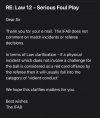Try on the following scenario:
Player slides in and cleanly wins a ball from his opponent. However, after winning the ball, which has gone to a teammate, he continues sliding and studs another opponent in the knee at force.
Are we really saying that SFP is not open? His slide and the follow through are part and parcel of the challenge. Saying otherwise is highly artificial, in my view.
In the present instance, the player's follow through is part and parcel of his playing the ball. He played the ball in circumstances where the ball was contested and, so, he was challenging for the ball.
We are getting wound in knots here all because we don't like a particular decision. It would be much easier to come clean and say 'I don't think he used excessive force or endangered the safety of his opponent', but that is not such a clear cut argument and so some are trying this elaborate circuit around the laws to say that it can't be SFP, and so therefore you have to be satisfied of the elements of VC before sending off. What pish.
Player slides in and cleanly wins a ball from his opponent. However, after winning the ball, which has gone to a teammate, he continues sliding and studs another opponent in the knee at force.
Are we really saying that SFP is not open? His slide and the follow through are part and parcel of the challenge. Saying otherwise is highly artificial, in my view.
In the present instance, the player's follow through is part and parcel of his playing the ball. He played the ball in circumstances where the ball was contested and, so, he was challenging for the ball.
We are getting wound in knots here all because we don't like a particular decision. It would be much easier to come clean and say 'I don't think he used excessive force or endangered the safety of his opponent', but that is not such a clear cut argument and so some are trying this elaborate circuit around the laws to say that it can't be SFP, and so therefore you have to be satisfied of the elements of VC before sending off. What pish.





 . Nonetheless, if there are times it is not VC, and if excessive force is used, what would it be I wonder?
. Nonetheless, if there are times it is not VC, and if excessive force is used, what would it be I wonder?